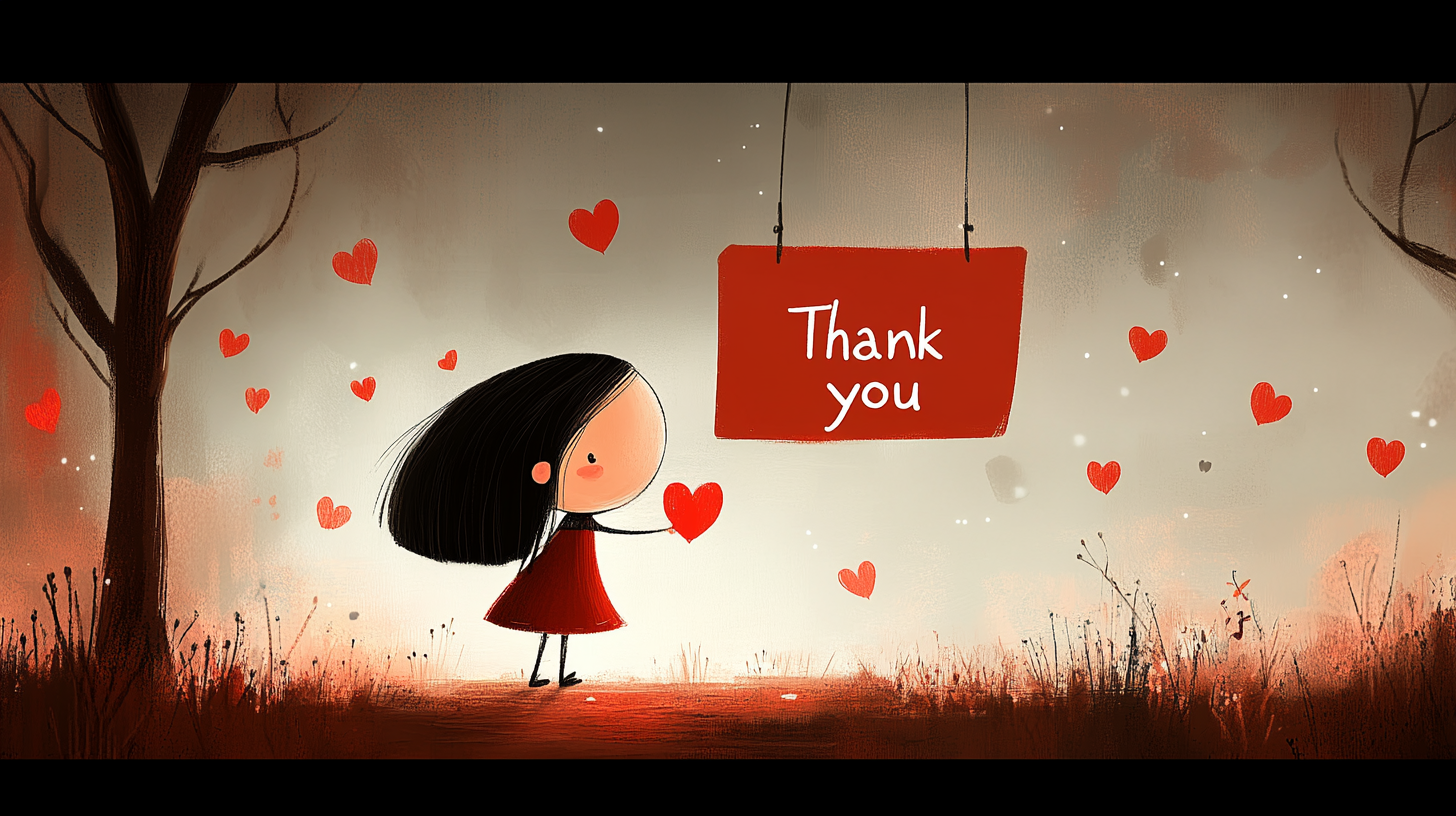“Thank” means saying “thank you” to someone who helped or gave you something.
以下は英単語 “thank” に関するストーリー型学習コンテンツです。まずは大枠の意味を理解して最後の文章で確認しましょう。
主な意味(main meaning)
| 品詞 | 発音記号 | 意味 | 英語例文 |
|---|---|---|---|
| 動詞 (verb) | /θæŋk/ | 感謝する | I want to thank you for your help. |
| 名詞 (noun) | /θæŋk/ | 感謝(の気持ち) | He gave her a warm thank for the gift. |
語源(etymology)
「thank」は古英語 thanc(感謝の気持ち)から来ており、元々は「思い・考え」を意味していた。そこから「ありがたいと感じる心」という意味に変化してきた。
類義語(synonyms)
| 類義語 | 英語例文 |
|---|---|
| appreciate | I really appreciate your support. |
| acknowledge | She acknowledged his kindness with a smile. |
| be grateful for | I’m grateful for everything you’ve done. |
| express gratitude | He expressed gratitude to his teacher. |
| give thanks | Let us give thanks for the meal. |
「thank」と「appreciate」はどちらも「感謝する」という意味を持ちますが、使い方とニュアンスに違いがあります。
| 比較項目 | thank | appreciate |
|---|---|---|
| 品詞 | 動詞 | 動詞 |
| 意味 | 「ありがとう」と言う行為(感謝の表現) | 感謝の気持ちを持っていること(感謝の認識) |
| フォーマル度 | カジュアル | ややフォーマル |
| 主な使い方 | thank + 人(for〜) | appreciate + 物や行為、または人の行為 |
thank は「行動」としての感謝 → 「Thank you!」と声に出して言う
appreciate は「心の中の感謝」や「評価する気持ち」を表す → 礼儀正しく深い意味を含むことが多い
反義語(antonyms)
| 反義語 | 英語例文 |
|---|---|
| ignore | He ignored her help and didn’t say thank you. |
| disregard | They disregarded her efforts completely. |
コロケーション(collocations)
| コロケーション | 英語例文 |
|---|---|
| thank you | Thank you for coming today. |
| thank God | Thank God it stopped raining. |
| thank someone personally | I want to thank you personally. |
| thank someone for something | She thanked him for the flowers. |
| give a big thank-you | He gave a big thank-you to the staff. |
2項表現(binomials)
| 表現 | 英語例文 |
|---|---|
| thanks and praise | He received thanks and praise from the team. |
| give and take | A good friendship needs give and take. |
英語ストーリー(english story)
Title: A Simple Thank You
Tom works at a small bookstore. One rainy afternoon, an elderly woman came in, soaked and tired. She had lost her bag and didn’t know how to get home. Tom gave her a cup of tea and let her sit by the heater. He called a taxi and paid the fare himself. The woman said, “I want to thank you personally. You’re very kind.”
The next day, the woman returned with a handmade scarf and said, “I’m grateful for your help.” Tom smiled and replied, “I just wanted to help. That’s all.”
His coworker, Lisa, heard the story and told others. Everyone in the store expressed gratitude and gave Tom thanks and praise. “It’s not a big deal,” Tom said, a little shy.
Later that week, the woman wrote a letter to the store. She wrote, “I want to express my appreciation to Tom. His kindness reminded me that there is still good in the world.”
Tom didn’t expect any reward. He believed in give and take and always tried to help others. Still, he felt happy to be acknowledged. After all, a simple “thank you” can mean a lot.
和訳
タイトル:シンプルな「ありがとう」
トムは小さな本屋で働いています。ある雨の午後、一人の年配の女性が濡れて疲れた様子で店に入りました。彼女はバッグを失くし、家への帰り方が分からなくなっていたのです。トムは彼女にお茶を出し、ヒーターのそばで休ませました。そしてタクシーを呼び、自分で料金を支払いました。女性は「個人的にお礼が言いたい。本当に親切ね」と言いました。
翌日、その女性は手作りのスカーフを持って戻り、「あなたの助けに感謝しています」と言いました。トムは微笑んで「助けたかっただけです」と答えました。
その話を聞いた同僚のリサは他の人にも伝え、店のみんなが感謝の気持ちを表し、トムに「ありがとう」と称賛の言葉を贈りました。「そんなに大したことじゃないよ」と、トムは少し照れながら言いました。
その週の後半、その女性は店に手紙を書いてきました。「私はトムに感謝の気持ちを伝えたいです。彼の親切さが、世の中にはまだ善意があることを思い出させてくれました」と書いてありました。
トムは見返りを求めていたわけではありません。彼は「ギブ・アンド・テイク」の精神を信じ、いつも人を助けようとしていました。それでも、誰かに感謝されることは嬉しかったのです。なにしろ、シンプルな「ありがとう」は大きな意味を持つのです。



コメント